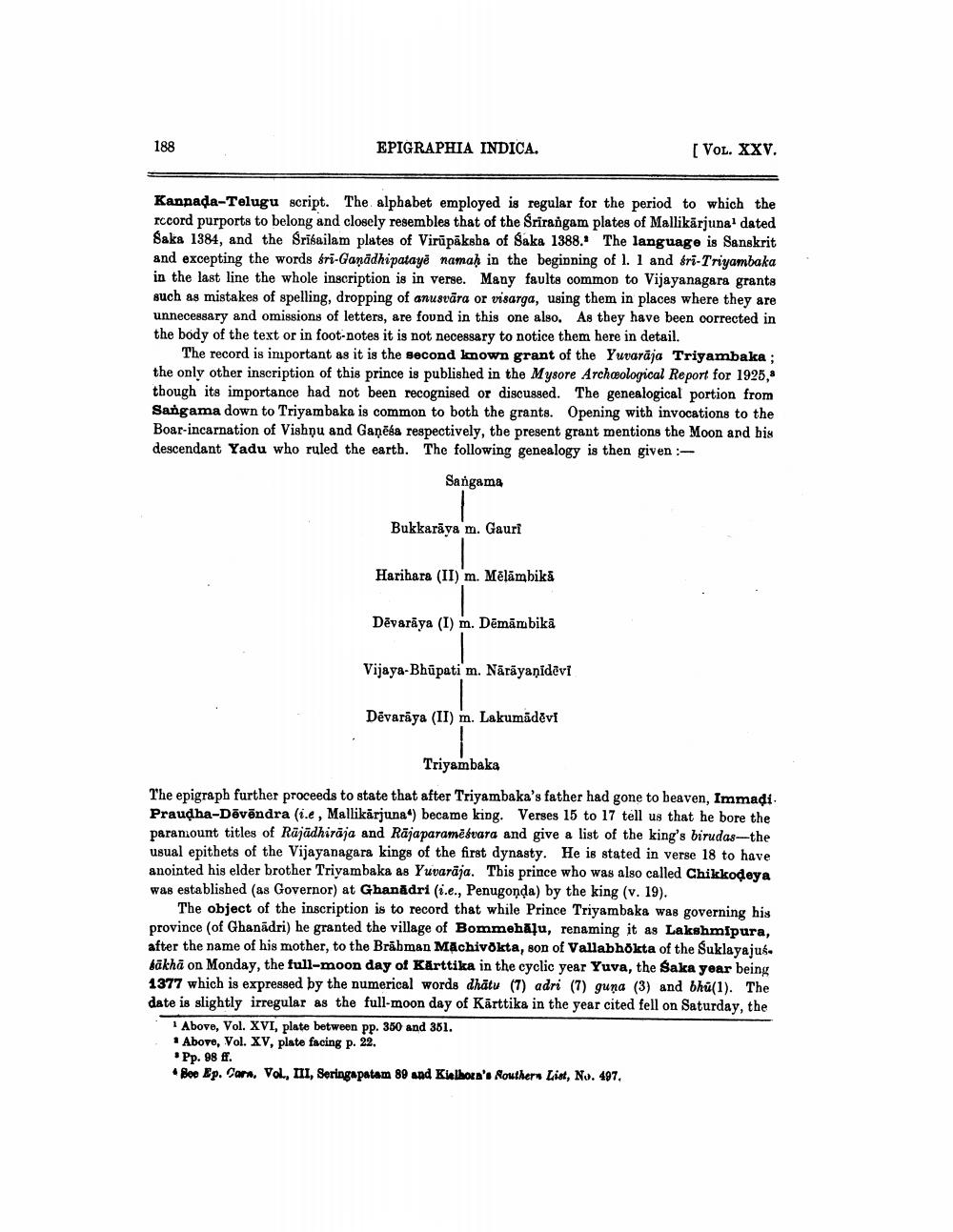________________
188
EPIGRAPHIA INDICA.
[Vol. XXV.
Kannada-Telugu script. The alphabet employed is regular for the period to which the rccord purports to belong and closely resembles that of the Srirangam plates of Mallikarjuna' dated Saka 1384, and the Srisailam plates of Virūpāksha of Saka 1388. The language is Sanskrit and excepting the words sri-Ganadhipatayi namah in the beginning of l. 1 and bri-Triyambaka in the last line the whole inscription is in verse. Many faults common to Vijayanagara grants such as mistakes of spelling, dropping of anusvāra or visarga, using them in places where they are unnecessary and omissions of letters, are found in this one also. As they have been corrected in the body of the text or in foot-notes it is not necessary to notice them here in detail.
The record is important as it is the second known grant of the Yuvarāja Triyambaka : the only other inscription of this prince is published in the Mysore Archeological Report for 1925, though its importance had not been recognised or discussed. The genealogical portion from Sangama down to Triyambaka is common to both the grants. Opening with invocations to the Boar-incarnation of Vishnu and Gaņēka respectively, the present grant mentions the Moon and bis descendant Yadu who ruled the earth. The following genealogy is then given -
Sangama
Bukkarāya m. Gauri
Harihara (II) m. Mēlāmbika
Dēvarāya (I) m. Dēmāmbika
Vijaya-Bhūpati n. Nārāyaṇidēvi
Dēvarāya (II) m. Lakumādēvi
Triyambaka
The epigraph further proceeds to state that after Triyambaka's father had gone to beaven, Immadi. Praudha-Dāvēndra (ie, Mallikarjuna“) became king. Verses 15 to 17 tell us that he bore the paramount titles of Rājādhirāja and Rajaparamēśvara and give a list of the king's birudas-the usual epithets of the Vijayanagara kings of the first dynasty. He is stated in verse 18 to have anointed his elder brother Triyambaka as Yuvarāja. This prince who was also called Chikkodeya was established (as Governor) at Ghanādri (i.e., Penugonda) by the king (v. 19).
The object of the inscription is to record that while Prince Triyambaka was governing his province (of Ghanādri) he granted the village of Bommehāļu, renaming it as Lakshmipura, after the name of his mother, to the Brăbman Machivokta, son of Vallabhokta of the Suklayajuś. sākhā on Monday, the full-moon day of Kärttika in the cyclic year Yuva, the Saka year being 1377 which is expressed by the numerical words dhātu (1) adri (7) guna (3) and bhū(1). The date is slightly irregular as the full-moon day of Kärttika in the year cited fell on Saturday, the
Above, Vol. XVI, plate between pp. 350 and 361. 1 Above, Vol. XV, plate facing p. 22. . Pp. 98 ff. Boe Ep. Cars, Vol., III, Seringapatam 89 and Kialhora's Routhern List, No. 497,




